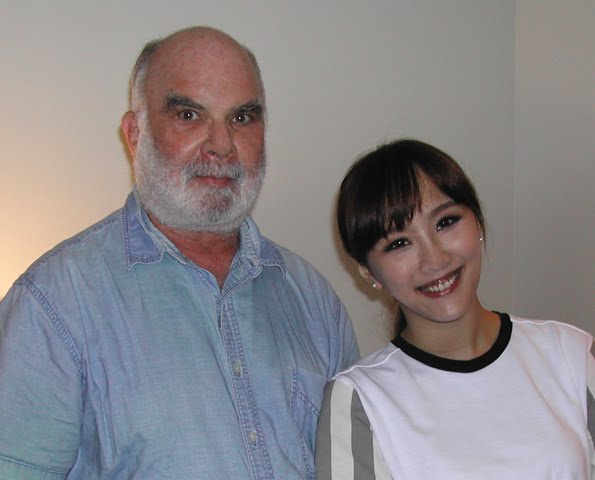 Sadawo Abe
Sadawo Abe,
Kou Shibasaki, and
Shinichi TsutsumiMaiko Haaaan!!!
Directed by Nobuo Mizuta
Japan, 2007, 120 min
Get ready, get set, go see this colorful, comedic confection about one man's obsession with maiko (apprentice geisha). Its one week exclusive run at the
ImaginAsian Theater in Manhattan starts this Friday, April 18th, 2008.
Sadawo Abe (aka
Sadao Abe) stars as Kimihiko (a.k.a. Kimi) Onizuka. Kimi's a lowly salaryman at a company that makes instant noodles (ramen) in Tokyo. He's also crazy for maiko and geisha, has been ever since meeting some in Kyoto while on a high school trip years earlier, as we learn in a flashback.
Sporting a bowl cut hairstyle that makes him look like a Japanese version of
Moe Howard of
The Three Stooges, Kimi is thrilled when he's transferred from the main office in Tokyo, where almost all of the ramen manufacturing takes place, to Kyoto, where only the toppings are made. He doesn't care that the transfer is a demotion, because it'll put him in proximity of the objects of his desire.
Once there he learns that the tea houses, where one enjoys the company of geisha, all have a "no first timer" policy. This requires that one be vouched for by a regular in order to be admitted, a rule intended to keep out coarse fools like himself. But Kimi is a resourceful fellow and eventually succeeds in having the company's president, Mr. Suzuki, vouch for him.
 Shinichi Tsutsumi
Shinichi Tsutsumi (left) and
Kou Shibasaki (right)
He then meets Kiichiro Naito (
Shinichi Tsutsumi, Japan Academy best actor award winner for 2005's
Always - Sunset on Third Street). He's a famous pro-baseball player, a drunken lout, and a geisha aficionado. He also happens to be the individual who'd earlier flamed Kimi's website, correctly calling him out as an amateur who'd never been to a geisha house. This meeting sets up an ongoing rivalry that produces hilarious results.
 Kou Shibasaki
Kou Shibasaki as Fujiko Osawa
Meanwhile, Fujiko (
Kou Shibasaki, whose credits include
Memories of Matsuko), the girlfriend Kimi dumped when he knew he was coming to Kyoto, has come to the city to become a maiko herself. Clearly she starts out hoping to win Kimi back, but things start to take a different turn once Kiichiro starts to exhibit a fervent liking for her.
Comic mayhem ensues what with the various rivalries and love interests, to say nothing of Kimi's crazy suggestions that somehow always succeed. It's all very upbeat and bouncy, aside from the one serious dramatic thread involving Kiichiro and another geisha, the very one who Kimi first met on that field trip several years ago.

Director
Mizuta on the set
The film is smartly helmed by second time director
Nobuo Mizuta. Born in 1958, his career started in TV in 1981. His first feature film was 2006's
Hanada Shonen-Shi. I'm pretty sure that he's deliberately included one scene as a nod to the end of
Akira Kurosawa's
High and Low, which makes him pretty smart and knowledgeable if I'm correct. If I'm wrong about this homage,
Mizuta's still a very talented fellow.
wrote the script. He joined the
OTONO KEIKARU theatre group in 1991, when he was about twenty-one years old. (
Sadawo Abe joined the group in 1992.) Besides writing for theatre and TV shows,
Kudo's film credits include
Ping Pong, which I reviewed in
ACF 048 and which is available on DVD from
VIZ Pictures.
Maiko Haaaan!!! is a delightful, cheerful and funny film. I give it a 3 out of 4 star solid recommendation.
For information about
Maiko Haaaan!!! at the
ImaginAsian, click
here.
I haven't been notified of any other planned screenings, but if I do rest assured I'll pass on the information. And while I always urge Asian film fans to support theatrical releases, I'm sure that there'll be a DVD release from
VIZ Pictures, distributors of the film, in the near future, for those of you who can't make it to a live screening.
 In Roughneck, the final film in the series, Akira Kobayashi plays Yuji, a "reckless troublemaker." He becomes involved with both an otobun (a younger gang brother) who's trying to go straight and a hot springs geisha, who's the lover of a local yakuza boss whose gang is being challenged by an outside rival.
In Roughneck, the final film in the series, Akira Kobayashi plays Yuji, a "reckless troublemaker." He becomes involved with both an otobun (a younger gang brother) who's trying to go straight and a hot springs geisha, who's the lover of a local yakuza boss whose gang is being challenged by an outside rival. Roughneck will be shown at Japan Society, 333 East 47th Street, between 1st and 2nd Avenues, Manhattan, on Friday, May 2nd, at 7:30 pm.
Roughneck will be shown at Japan Society, 333 East 47th Street, between 1st and 2nd Avenues, Manhattan, on Friday, May 2nd, at 7:30 pm.
























